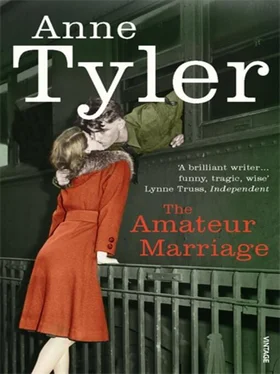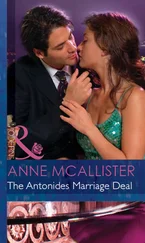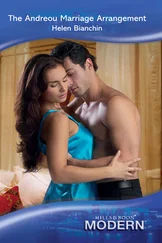He was traveling east on Northern Parkway, driving aimlessly, facing pale, wintry sunlight with one finger on the steering wheel. The radio was playing “The White Cliffs of Dover.” Why couldn’t music today sound like that? He liked the way the singer kept her voice so plain and ordinary, too intent on expressing her sadness to concern herself with effect.
Not till he hit Rock Road did he realize he was heading toward the old store. Silly of him. It was true that a half-gallon of milk was on today’s mental to-do list, but there were plenty of groceries nearer to hand than Anton’s. Or World O’Food, rather. He hated that name. He hated the whole chain-supermarket concept, and felt miserable any time he set foot in the place, but somehow his car kept finding its way there. Now he relaxed and gave in to it, listening absently to an interview with a man who had served in France. He had lost both his brothers, three cousins, and his best friend in that war, the man said, speaking in a reflective voice, showing no sign of outrage. Imagine the youngsters nowadays accepting such a state of affairs! They would look for someone to sue, Michael thought. (Lindy certainly would.) Somewhere along the way, people in this country had developed the assumption that life should be unvaryingly logical and just. There was no recognition of random bad luck, no allowance for tragedies that couldn’t be prevented by folic acid or side air bags or FAA-approved safety seats.
He passed a strip mall that he could have sworn had not existed a month ago. He passed the dry cleaner where he used to take his clothes when he lived in his old apartment, except now it was a video shop. Then here came the grocery, expanded to engulf the businesses that had once stood on either side of it, repainted in World O’Food’s signature blue and green with the 0 a little globe. The gravel parking lot had been paved, admittedly an improvement. His tires rolled over the asphalt with unsettling smoothness. He parked between two SUVs and inched out from behind the wheel, favoring the one hip, and shrugged himself into his jacket. It was disheartening to see so many cars — far more cars than there had been when the place was his.
Inside, even the layout was different. They’d moved the florist department to the front. They’d replaced the registers with scanners and added a blond wood display case at the rear with a neon O’CUISINE in cursive lettering above it. Sushi rolls, pasta salads, chicken couscous, alfalfa-sprout wraps… What on earth? At the meat counter, a Middle Eastern — looking young woman in jeans and clunky-soled shoes that added several inches to her height was comparing jars of caviar while the young man with her — vividly blue-eyed, speaking in an Irish accent — asked whether imported could really be all that much better than domestic. A toddler in a full set of ski clothes begged her mother for tofu hot dogs.
Even the dairy case sported changes. Michael noticed a new line of milks and creams bottled nostalgically in glass, but he chose a carton of plain old Cloverland and headed for a checkout counter.
The clerk wore a nose ring and an eyebrow ring. It was hard for Michael to look at her.
Outside, the cold air was a relief. World O’Food had been overheated. After he’d put the milk in his trunk he stood a moment weighing his keys in one hand, postponing getting into the car again. Then it occurred to him that next on his schedule was his exercise walk. Why not stroll up Rock Road a ways instead of trudging his neighborhood streets the same as on every other day? He dropped his keys into his pocket and set off.
Thirty minutes each morning, the doctor had advised. Michael checked his watch. He’d do fifteen minutes and turn back. He never went overtime, because walking wasn’t really something he enjoyed. It was too empty-headed and too slow, especially now that his limp had worsened with old age. The skewed rhythm of his gait always set up the same meaningless refrain in his mind: I THINK so but I don’t KNOW so, I THINK so but I don’t KNOW so, his good leg coming down hard on “think” and “know,” the bad leg sliding across the softer words in between.
His war wound, Pauline used to call it. He’d grown so accustomed to the phrase that he could almost imagine he had actually seen combat, although of course he hadn’t. Would he ever get over feeling guilty for that? In the old days he used to hold Pauline responsible. (If he hadn’t been so upset by her frivolous behavior, by her letters describing canteen dances and handsome jitterbug partners, he never would have started that crazy feud with his bunkmate.) Now, though, he thought it had been his own basic nature that was to blame. He was the kind who stood aloof while others waded in. He had no illusions whatsoever that he would have made a good soldier. In fact, he would most probably have been killed in his first real battle. So it wasn’t that he wished he’d gone to the front, but that he wished he’d been the type to go. He wished he had inhabited more of his life, used it better, filled it fuller.
… THINK so but I don’t KNOW so, I THINK so but I don’t … and then a honking pickup truck blotted out the rest. He supposed he made drivers nervous — an old man limping unsteadily on the shoulder of the road. Old man! A shock all over again.
Lately he had noticed in himself a tendency to start a sentence and then let it run on automatically while he thought of other matters, often with bizarre results. Intending to tell Anna “This tastes delicious” at supper last night, he had heard himself say, “This tastes ridiculous.” And only a few minutes afterward: “Why don’t you sit and rest while I put the dishes in the computer?” He wondered if his mind was going — every old person’s nightmare. Or maybe it was just that he had said those identical sentences so many hundreds and thousands of times, his tongue had begun rebelling against the sheer monotony.
Another honk, this one so loud it made him start. He lurched farther off the pavement and looked for someplace safer to walk, and what should he spy across the street but the gateway to Elmview Acres.
Funny how dowdy it looked — the wrought iron pocked with rust, the brick pillars gone porous and greenish, EST. 1947—a date that had once been so modern, but now it sounded quaint. And when he crossed Rock Road and started up Elmview Drive, he was surprised by the height of the trees. Even in December, the development’s scalped look was gone. The houses (“ranch” houses, outmoded now) had skirtings of thick greenery where once there had been bald earth and spindly starter shrubs.
He chose the right-hand fork, the one that curved toward Beverly Drive. I THINK so but I don’t … A woman in a plaid coat was walking her dog. A woman in her bathrobe came out on her stoop for her paper.
At least it was the same place, more or less, although most of the people living here hadn’t even been born when he and Pauline first moved in. St. Cassian, on the other hand… He’d gone back there this past fall, he and Anna, to visit the Kazmerows one Sunday. They were still in their old row house (though their daughter had a mansion in Guilford, and one of their grandsons did something with high finance), but much of St. Cassian was boarded up now, dead or dying. The original Anton’s Grocery had a padlock on the door and graffiti sprayed across the front, and when he and Leo walked past after lunch he thought he heard a scrabbling inside — a rat, or a drug addict, or a ghost. Neighboring streets had gone all chic with artists’ studios and overpriced antique shops and whimsically named pubs frequented by college kids, according to Leo — defaced in a whole different way. Oh, and did he know, Leo said, that Ernie Moskowicz was in a nursing home now, and the last of the Szapp boys had died of a stroke, and the Golka twins had died too within a month of each other, one of cancer and the other of pneumonia? And anyhow, they had long before then moved away from the neighborhood.
Читать дальше












